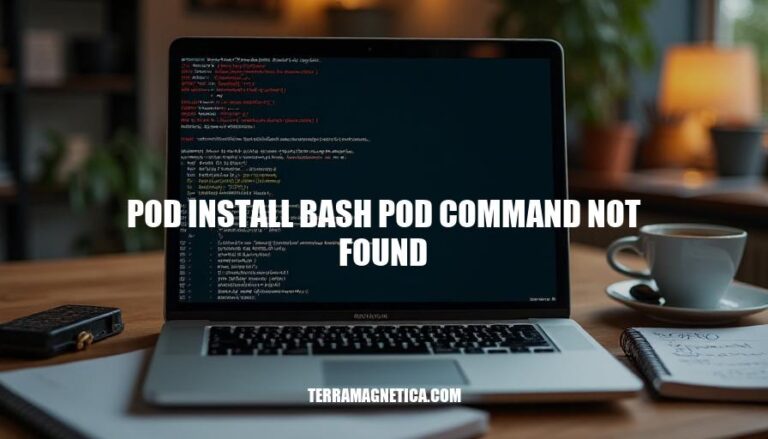


Encountering the “pod install: bash: pod: command not found” error is a common issue among developers working with iOS projects. This error typically arises when the CocoaPods dependency manager is not properly installed or configured on the system. Given CocoaPods’ widespread use for managing third-party libraries in iOS development, resolving this error is crucial for maintaining smooth project workflows.
The error pod install: command not found typically arises when the CocoaPods gem is not installed or not properly configured in your system’s PATH. CocoaPods is a dependency manager for Swift and Objective-C projects, commonly used in iOS development.
sudo gem install cocoapods.pod command if the installation path isn’t included in the system’s PATH environment variable.pod install, which is crucial for fetching and integrating dependencies specified in the Podfile.To resolve it, ensure CocoaPods is installed and the PATH is correctly set.
Here are the common causes of the ‘pod install bash pod command not found’ error:
Missing CocoaPods Installation: If CocoaPods isn’t installed, the pod command won’t be recognized. Install it using:
sudo gem install cocoapods
Incorrect Path Settings: The terminal might not be able to find the pod command if the path isn’t set correctly. Ensure your PATH includes the directory where CocoaPods is installed. You can add it to your .bash_profile or .zshrc:
export PATH=$PATH:/usr/local/bin
Terminal Environment Issues: Sometimes, the terminal environment might not be configured correctly. Restarting the terminal or sourcing the profile file can help:
source ~/.bash_profile
These steps should help resolve the error.
Here’s a detailed, step-by-step guide to troubleshoot and resolve the ‘pod install bash pod command not found’ error:
Check if CocoaPods is Installed:
pod --version
Install CocoaPods:
sudo gem install cocoapods
Verify Installation:
pod --version
Update System PATH:
.bash_profile, .zshrc, or .bashrc file (depending on your shell):export PATH=$PATH:/usr/local/bin
source ~/.bash_profile
# or
source ~/.zshrc
# or
source ~/.bashrc
Check Ruby Environment:
rbenv or rvm to manage Ruby versions. Install rbenv with:brew install rbenv
rbenv init
rbenv to your shell.Reinstall CocoaPods:
sudo gem uninstall cocoapods
sudo gem install cocoapods
Run pod install:
pod install
Verbose Mode:
pod install, use verbose mode to get more details:pod install --verbose
Check for Podfile:
Podfile exists in your project directory. If not, create one using:pod init
Check for Xcode Command Line Tools:
xcode-select --install
Clean and Rebuild:
rm -rf ~/Library/Caches/CocoaPods
rm -rf Pods
pod install
Following these steps should help you resolve the ‘pod install bash pod command not found’ error.
Here are some preventive measures:
sudo gem install cocoapods.export PATH=$HOME/.gem/bin:$PATH.pod install --repo-update to keep dependencies up to date.pod install.pod install.These steps should help you avoid the ‘pod install bash pod command not found’ error in the future.
Follow these steps:
pod install in verbose mode for more details.Regular updates, proper environment configuration, dependency management, network stability, and checking the Podfile can help prevent this error in the future.